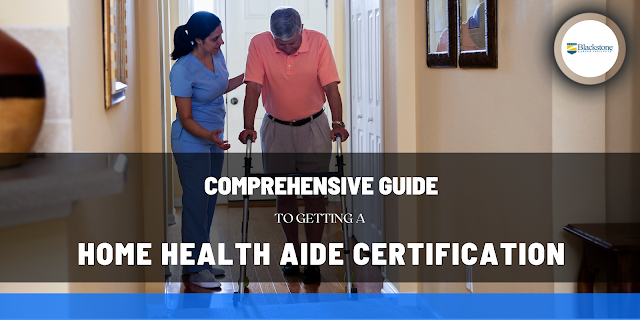Comprehensive Guide to Getting a Home Health Aide Certification
If you are interested in healthcare and want to make a remarkable impact in others lives, becoming a home health aide can be a great career choice. Home health aides provide personal care and assistance to patients who need help with daily living activities, such as bathing, dressing, and grooming. However, you must have the appropriate training and certification to ace the home health aide game. This blog will discuss everything you must know about getting a home health aide certification.
Duties of a Home Health Aide
Before taking a dive into the details of becoming a home health aide and which home health aide training program to take, it's important to understand the role and duties of a home health aide. Home health aides work in various settings, including private homes, group homes, and hospice care facilities.
Some of the duties of a home health aide include
- Helping patients with personal care, such as bathing, dressing, and grooming.
- Assisting patients with mobility, including getting in and out of bed or a wheelchair.
- Providing medication reminders and assisting with medication management.
- Preparing meals and feeding patients if necessary.
- Providing emotional support and companionship.
- Monitoring patients' vital signs and reporting any changes to a supervisor.
As a home health aide, you may work with patients who have chronic illnesses or disabilities, and you may be responsible for helping them manage their symptoms and maintain their independence. It can be a challenging but rewarding job, and the demand for home health aides is expected to grow exponentially in the years to come, and so is the need for home health aide programs.
How to Become a Home Health Aide
To become a home health aide, you need to have a high school diploma/equivalent and complete an accredited home health aide training program. The training program should cover topics such as patient care, medication management, infection control, and communication skills. Many home health aide training programs are available, both in-person and online. The Blackstone Career Institute is a well-known provider of home health aide training online.
When choosing a home health aide program, it's essential to make sure that it is accredited by a recognized organization, such as (NAHC) National Association for Home Care and Hospice. This will ensure that you receive the appropriate training and that potential employers will recognize your certification.
How to Get Home Health Aide Certification
After completing a home health aide training program, you must pass a certification exam to become a certified home health aide. The certification exam will test your knowledge of patient care, communication skills, and other relevant topics. The exam is typically administered by the state or a third-party organization, such as the National Association for Home Care and Hospice (NAHC).
Once you have passed the certification exam, you will be a certified home health aide and can start looking for employment. Many home health care agencies and hospice care facilities hire home health aides, and you can also work independently as a private duty home health aide. Advancing your career as a home health aide may involve continuing education and additional certifications.
Conclusion
Becoming a home health aide can be a fulfilling and rewarding career, and getting certified is the first step in this journey. With the right training and certification, you can help patients maintain their independence and improve their quality of life. The BCI's home health aide training programs can provide the education and training you need to become a certified home health aide. Whether you choose to work in a private home or a hospice care facility, your work as a home health aide can make a positive difference in the lives of your patients.

.png)


Comments
Post a Comment